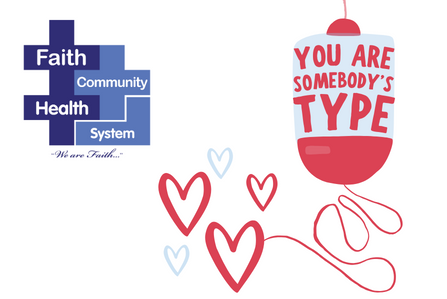Give the Gift of Life
Have you ever thought about being a hero? You can do it! In fact, all you need to do is donate a pint of blood to a community blood drive.
And, as luck would have it, in time for National Blood Donor Month (January), Faith Community Health System is holding a blood drive on Jan. 9 at Faith Community Hospital. To register, click here.
You can donate blood every eight weeks — up to six times every year. While only about 3 percent of people who are eligible to donate blood actually do it, every pint of blood donated saves lives.
“At Faith, we are really working hard to increase the number of people who regularly donate blood,” said Karla Miller, Faith Community Health System’s Laboratory Director. “It’s so important to make sure all healthcare facilities have the blood supplies they need on hand. Blood donations literally save lives.”
Why is Blood Donation So Important?
According to the Red Cross, every two seconds, someone in the United States needs blood. For over 50 years, January has been National Blood Donor Month because donations typically take a dip in winter months–due to inclement weather and illness.
“Raising awareness at the beginning of the year will hopefully inspire blood donors – those who have donated before and those who have never considered donating blood – to start a routine of regular visits to a mobile blood bank or other donation site,” Miller said.
Every blood donation has the potential to save up to three lives! Your donated blood is separated into three lifesaving elements — red blood cells, platelets and plasma — and each with a specific use.
There is no substitute for the real thing. To put it plainly, blood can’t be made in a lab. There isn’t a never-ending supply and, every day, healthcare facilities need approximately 30,000 units of blood to effectively manage the care of patients who come through their doors.
When you do the math, understanding why every drop from every pint of donated blood is so vital to keeping our communities healthy. Additionally, unlike donating a vital body organ, your body regenerates blood constantly. When you donate blood
I’ve never donated before. What can I expect?
Feeling a little anxious about the blood donation process? You’re not alone; it’s normal to be concerned about things you don’t know much about. And particularly when it comes to blood donation, it’s a very personal subject.
Here’s what you can expect when you volunteer to donate blood.
Registration – You’ll be asked to fill out a form with your name, address and other identifying information. You’ll be asked to show ID, like a driver’s license or other state issued identification.
Health History and Mini Physical – If you’re not feeling well, choose another day to donate blood. While it’s perfectly safe to donate, it’s best if you’re in good health, for your own safety. You’ll be asked to provide some details on your current and past health history, and you’ll be giving a mini physical, including having your temperature, pulse and blood pressure taken. The practitioner will also prick your finger to check your hemoglobin level (red blood cells).
Donation – Once you’ve answered all the health history questions, and your blood has been deemed safe for donation, it’s time for your donation! Your arm will be cleansed, and then the phlebotomist (a specialist in blood draws) will insert a sterile needle into your vein. Sit back and relax while the donation bag is filling. A typical blood donation takes only around 10 minutes and you’ll be done before you know it. Once you’ve filled a pint-sized bag with blood, the technician will remove the needle and bandage your arm. You’re done!
Snacks, Drinks and Rest – While donating blood is very safe, it does take a little time to recover from the donation. Your body is adjusting to a lower volume of blood, until it replenishes. After your donation, you’ll spend a few minutes resting, snacking on some cookies, and maybe drinking some juice. Once you’ve rested for 15 minutes or so, you are free to leave and continue with your day.
Aftercare – Be sure to drink plenty of non-alcoholic fluids on the day of donation, keep your bandage on for about 5 hours, and avoid heavy exercise on donation day. You may feel dizzy or weak for a few hours after your donation. Listen to your body, and rest as needed.
Are you ready to be a lifesaving hero?
Step up and donate blood on January 9 at the FCHS Blood Drive. Look for the mobile bus, located between the EMS building and Wellness Center. To register, click here.
“In addition to truly helping out the community by donating blood, you’ll also find out more about your blood type and get a check on your own cholesterol levels,” Miller said. “It’s a win-win!”

